The Walking Dead: The transformation of Rick Grimes
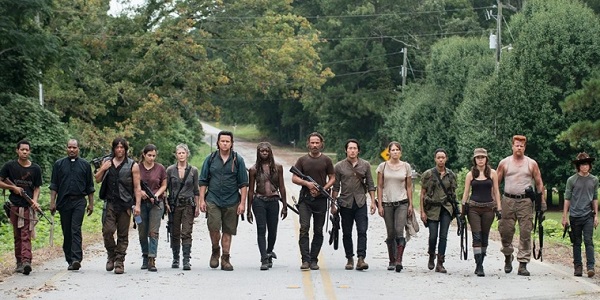
Finding its beginnings as a Comic Book series in 2003 and spanning 171 issues and counting, The Walking Dead is a post-apocalyptic survival series written by Robert Kirkman and illustrated by Tony Moore. The series follows the story of King County sheriff ‘Rick Grimes’. Grimes awakens from a coma at the beginning of the apocalypse and reunites with his family amidst a group of survivors. As the story progresses, the group collectively expands as the narrative is riddled with character deaths and introduction of new characters frequently. The comic book was met with a broad array of positive critical reception which eventually resulted in a television series adaptation which began airing on AMC in 2010. Since then, It has become one of the most watched televisions series in the modern era and rightfully so, providing for an enthralling narrative which transcends the stereotypical zombie apocalypse gimmick which audiences have been subject to in the past. Kirkman’s brainchild isn’t merely about the survival of the characters themselves, but rather, the innate humanitarian traits which make them human in the first place- traits which are challenged and compromised by the testing circumstances.
“The transformation of Rick Grimes”
As the story progresses, the survivors move from location to location. As this exposure to new environments continues, the characters begin to encounter more and more trials and tribulations along the way, which warps their understanding of what is necessary in order to survive. No one amongst the entire ensemble of characters within this series understands this concept of survival at any cost, better than the primary protagonist Rick Grimes. Perhaps most fascinating about Rick’s character development as he is shaped by new experiences, would be his pre-apocalyptic occupation as a sheriff. This made him a symbol which represented justice and order. In a lot of ways, Kirkman uses Grimes’ character as a way to exhibit the corruption of this justice and order and also to explore how sometimes, the morally righteous thing to do isn’t always the most effective. Overall, the devolution of humanity within Rick is indicative of how morality isn’t a transparent concept and sometimes, doing what is necessary to survive takes precedence over doing what is right.
“The Ricktatorship”
Initially Rick Grimes began his humble post apocalyptic journey in hopes of reuniting with his family. Upon doing so, he was soon to discover that his presumed death in a coma prior to the apocalypse resulted in his wife Lori sleeping with his best friend Shane. Tensions grew between rick’s family and this ultimately had a ripple effect on his role as a leader within the group of survivors. This insurmountable tension eventually tormented Rick to the point where he was forced to murder his once closest ally. It is this very act which triggered perhaps one of the most volatile character transformations within the entire series. Rick had hit his moral breaking point as the complexity of the situation was further amplified upon the discovery that his wife was pregnant. This darkness which had been summoned within Rick eventually reared its ugly head in his speech where he established his leadership within the group. In what was arguably actor Andrew Lincolns most passionate dialogue which the show had seen to date, he emphatically delivers the following line which sent chills down the spines of audiences: “This isn’t a democracy anymore”. This scene was so iconic that it coined the famous term ‘The Ricktatorship’ when referring to Grimes’ role as a leader amongst the survivors.
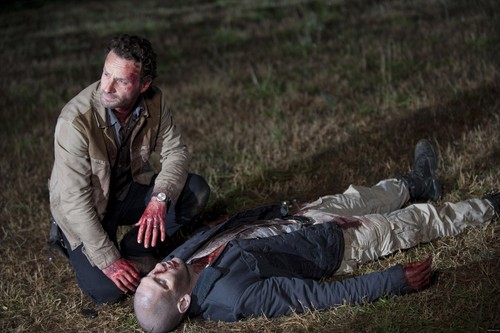
“Fight the dead, Fear the living”
As Ricks journey as leader continues to endure the moral and physical obstacles it encounters, his true mettle is tested and he begins to learn new lessons not just about himself, but also, the group dynamic. This is largely attributed to the increasing encounters with other factions such as the ‘Woodbury’ community led by the cold and calculating antagonist ‘The Governor’ who is introduced into the prison arc of the television series. It is within this arc where the complications of the Walkers themselves is compounded by the risk of other human beings whose humanity has been degraded by the experiences they have had, hence the tagline of the corresponding season ‘Fight the dead, fear the living’. Ricks spiral into insanity within this story is arc is a huge component of the character he currently is as he was faced with extremely testing circumstances. Examples of this include where he was forced to amputate fellow survivor and eventual mentor ‘Hershal Greenes’ leg, in order to stop a bite from spreading. This is further evident in S3 E4 aptly titled ‘Killer Within’ where Rick is forced to bear the burden of the death of his wife Lori- this is a situation which is complicated even more, by the fact that his son Carl had to be the one to execute her before she turned into a Walker. Andrew Lincolns reaction to this event was once again a prevalent showcase of his competence as an actor. Perhaps more difficult to comprehend for Rick wasn’t the death of Lori, but rather, having to witness his son subject to the same darkness he has. A darkness which surfaces itself in the scene where Rick executes the prison inhabitant ‘Tomas’ without hesitation delivering the phrase ‘Shit Happens’ with a concerning degree of coldness.

“If you don’t fight, You die- The Rick Grimes philosophy”
This devolution of humane traits which has manifested itself within Rick surface themselves in varying intensity as the series progresses and he is forced to commit more and more morally questionably acts in order to save both himself and the group of survivors. Other acts which demonstrate this decay of humanity would be Ricks encounter with the hostile group ‘The Claimers’ who were a television series adaptation of the comic book antagonists ‘The Marauders’. The Claimers ambushed Rick, fellow survivor ‘Michonne’ and of course his son Carl- a rather disturbing situation which escalated into Carl being pinned down and nearly raped. Witnessing this incites literal animosity within Rick as he protects his son by biting out the jugular off the marauders and butchering the remainder of them with a knife. This scene is especially iconic because it is perhaps the rawest portrayal of sheer desperation within Rick, which, given the situation, was justifiable to some degree. Overall this malicious act of vengeance by Rick and the convoluted intentions of The Claimers themselves are both indicators of the devolution of humanity which Robert Kirkman aims to portray in The Walking Dead.
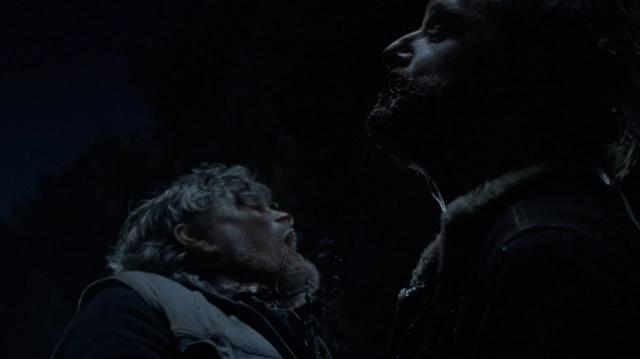
“The effect of the outside world on Rick’s Psyche”
Following the disturbing encounter with ‘The Claimers’ was Rick’s confrontation with the cannibalistic faction known as Terminus. As Rick does battle with the antagonistic group, he menacingly pursues them to ensure they are dead even after destroying their compound. This pursuit eventually culminates in a massacre at the hands of Rick and his allies where Rick brutally butchers Terminus leader ‘Gareth’ with a machete, as he begs for mercy. Perhaps the most chilling thing about this scene is the manor in which they are executed. All of the killings were carried out with blunt forced and knives in order to spare bullets- this truly indicated the desperate nature of their circumstances. The setting itself of the massacre being a church, was especially ironic considering the unsanitary nature of the act. This was also symbolic of the overall devolution of humanity and abandonment of faith in the apocalypse. This is solidified when previously religious character ‘Maggie Greene’ bluntly dismisses the church as ‘four walls and a roof’, in defence of Ricks actions. Overall this very grim encounter marks perhaps one of the darkest story arcs for the character development of Rick displayed in his lack of mercy. There seems to be somewhat of a pattern occurring as the narrative progresses- the more time the character spends in the outside world, the less intact with his sanity he becomes, so much so that it even begins to affect his ability to function even within a safe haven. This defining moment solidified Gareth’s twisted philosophy of being either the ‘butcher’ or ‘the cattle’.
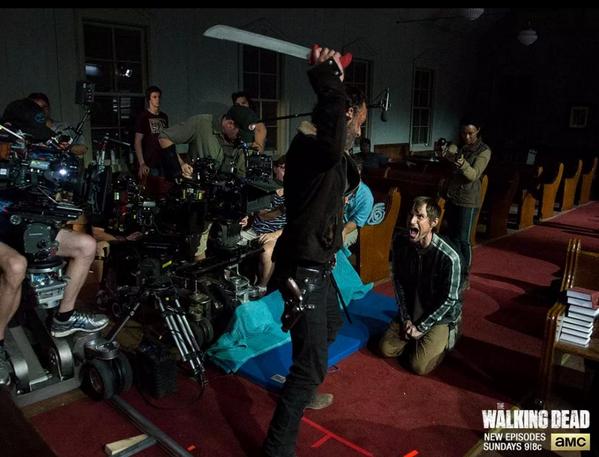
This eventually begs the question as to whether Rick’s circumstances are a product of the apocalyptic world itself and he is merely a blank canvas which Robert Kirkman uses to illustrate the corruption of humanity. On the other end of the spectrum however, Rick can be viewed as one who is brave and courageous enough to do what is necessary to survive. Audiences have somewhat of a skewed perspective however, as a majority of the story is told from the perspective of Rick and therefore his actions have context which would prompt justification. It is through this dynamic however, where Kirkman forces somewhat of a cognitive dissonance among viewers by consistently intensifying the degree of remorselessness Rick shows. The true nature of this devolution of humanity within the character is evident in his difficulty to integrate within the civilized ‘Alexandria Safe Zone’ community. The degree of this transformation is evident in Rick finding simple human interactions such as a dinner party, difficult to undertake. This inability to assimilate within the community seemingly imploded within Rick upon discovery that a member of the Safe Zone- Pete, was physically abusing his wife. He felt compelled to take action perhaps because of his romantic interest in Pete’s wife- because of this anterior motive, Ricks true intentions here are undoubtably questionable. Nevertheless, he confronted Pete about it in one of the series most intensely iconic fight scenes to date. This was followed up by yet another verbal outburst by Rick in which he berated the members of the safe zone for their hesitation when dealing with threats. the situation escalated to the point where Rick pulled a gun on them. This speech cemented his philosophy of “If you don’t fight, you die” and what it means to live in the ‘real world’. A philosophy which has dictated Rick Grimes actions since the beginning of his transformation.
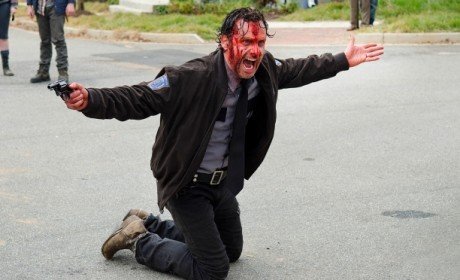
So far, The Walking Dead has illustrated the effect of the post apocalypse on the human psyche using drastic character transformations such as that of Rick. In hindsight, these extreme experiences were hardly attributed to interactions with the undead as they were with the living. This proves that Kirkman’s narrative transcends a mere fight for survival and focuses on something bigger. The fight to keep ones humanity intact. Only time will tell if Rick is able to combat the darkness within before he is ‘Too far gone’ and the upcoming war with with the ruthless ‘Saviors’ led by the cunning antagonist Negan, will be the ultimate indicator of this.
“ALL OUT WAR”
Rick faces an uphill battle as the aforementioned threat of the Saviors has seemingly eclipsed any hope of maintaining his inner peace. This is evident in the intense exchanges Rick has had thus far with their leader Negan, who is brilliantly portrayed by Jeffrey Dean Morgan as the jolly sociopath comic book readers of the series grew to know and love. Negan seems to incite a rage within Rick like never seen before and this is emphasised by the dialogue shared between the two where Rick has displayed heinously stubborn rage promising to kill Negan- even situations where the latter would’ve been able to extinguish Rick immediately. After butchering both Abraham and Glenn, Negan stripped Rick of a great deal of man power rendering the small community of Alexandria even more vulnerable than they initially were and given the circumstances of the All out war story arc, Rick may indeed be forced to revisit the rage within, which helped him overcome the threats of the claimers and the termites, and use it to overcome the Saviors who threaten to jeopardize his vision of a ‘larger world’, with the amalgamated communities of the Kingdom, Hilltop and Alexandria living together in harmony.
Despite the threat of the Saviors and the desperation of his current situation, recent events such as the potential death of his son Carl, may drive Rick to approaching the conflict in a more humane and rational manor. In the mid-season finale and the events leading up to it, Rick is able view Carl abandoning the coldness previously evident within him and be more hospitable towards others who are trying to weather the apocalypse. His previously pessimistic and dismissive attitude- which dates as far back to the conflict with Woodbury and is evident in acts such as when he shot and killed a surrendering Woodbury teenager, has been somewhat replaced to accomodate altruistic acts such him saving a stranger from impending death at the hands of a horde of walkers and getting bitten in the process which will very likely lead to his demise. Carls maturity and rationality despite the overwhelmingly compromising circumstances may very well reflect within Rick following his demise, however this could also be overthrown by his lust for vengeance against Negan.
What do you think? Leave a comment.










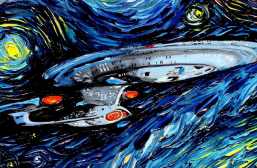
This transformation is great. At first I thought that it was just his look. But you can see that he’s changing also mentally first he was helpful emotional and clueless. Now he’s a mad man cold hearted and still emotional. He protects his people sometimes having to live with the losses of others. He’s kinda turning into Negan. Negan wouldn’t killed Glenn and Abe if Rick’s group didn’t fuck with the Saviours and killing lots of Negans.
The season finale was embarrassing for the show.
What’s truly great about this show is its ability to make you question whether or not you’re really rooting for the right people. Some evil is obvious, some is less so. The characters we love as well as the ones we hate are all guilty. Rick’s changes in psyche and his motivations throughout the show are what make it so gripping.
SPOILERS: Carl’s death is gonna be a huge change for rick.
Interested to see how the death of Carl effects not only Rick but the entire cast, love the concept of this article, with Rick there is a lot to analyze!
Probably one of the best characters ever put to screen. Fascinating character development throughout the show. Andrew Lincoln should’ve gotten Emmy at this point.
Rick is an amazing reasonable, caring, badass leader and Andrew Lincoln is so good at portraying that in the character.
This shows the evolution of Rick the man, to Rick the ultimate BADASS!. Rick from Season 1 wouldve been so timid and submissive if Neegan had showed up then. The NOW Rick… Hes going to destroy Neegans world up no matter what it takes, even if he has to die trying. Rick aint gonna die though, Ricks gonna destroy Neegans world up. I just know it.
I liked season 4 and 5 rick better, have no idea why.
Great analysis. I’ve seen every walking dead episode ever and looking back on moments like this gives me the chills.
In season one the scientist says “The day will come when you won’t be” to Rick when he said “I’m greatful”. The day will come when you won’t be is a name of an episode in season 7 I believe. Damn that’s cool.
I love Rick, he’s the best character.
Rick is a cool dude he loves his family Carl and Judith he will kill anyone for them just trust me he is not the good guy anymore…The day will come when u won’t be.
This sums Rick up perfectly.
It’s amazing how far they all come at first they didn’t know each other and had serious trust issues but now there all like one big family who will do anything to protect and keep each other alive a little longer.
Rick is actually going back to his older self right now which is really cool.
Rick Grimes is the king. Andrew Lincoln deserves many Emmys. Bring back the jacket!
Makes me wanna go back and watch the old seasons. Forgot how good it was.
Rick can seem worse than Negan apart from not being a Dictatorship group. He cares about people, Negan doesn’t, they are similar.
My favorite rick moment was when he killed that man in the hilltop after he stabbed Gregory, he was so used to death by that point and protecting himself and his own (not Gregory but his group) that he just looked at those people of hilltop and said “What?”.
He pretty much became Shane, which is a good thing because Shane was my favorite character and now Rick is with Negan a very close 2nd.
I love how this transformation was built up from Season 1 to now! Now that is great character development!
A little trip down memory lane. Love TWD.
Good work pointing out that we usually follow the perspective of Rick, thereby skewing our view of what is going on. Looking forward to seeing what happens in the back half of this season when it returns tonight!
I love your commentary on the show’s complication of morality–one of the key strengths of the horror genre. What is evil, what is good? And what kind of things change our answers to these questions? Great article!
I thought I was all caught up, but apparently Carl is going to die now. Oops, lol.
Rick’s response to Jadis bothered me. Yes she has betrayed him and cannot be trusted, but it goes against Carl’s world view.
Watching The Walking Dead has fueled some what-if day dreams for me. After witnessing the trials of the group, I can safely say that in a post-apocalyptic zombie situation, the leader life would not be for me. I love how you point out the gray areas of morality that Rick has to wade through. Here is is, leading a group of people who he never knew existed before this new reality, trying to please everyone, be fair to everyone’s wishes and beliefs and also do what he feels is right. Any sane person WOULD go a bit insane under that type of pressure. Will be interesting to see how his journey progresses.
No matter what happens, I can’t get over a scene in the finale of season 4, when Rick bites a guy to save Carl.
This article is still relevant after the Season 8 finale. Rick has seemed to have done a complete 180 in how he views the world now. It isn’t good v evil – people are just people, and need to work through their differences to succeed. Have to admit this disappointed me – I was looking forward to seeing some payback. There’s always next season though!
a solid piece of Ricks evolution throughout the show. I loved Rick so much! was fully a part of the Ricktatorship! I say ‘was’ because after the show killed off Carl I stopped watching. I did not watch the episode of him passing but when I found out he was going to die, I threw in the towel and not even my love for Rick could keep me watching. And I am not even that big a fan of Carl but I just thought the writers decision to kill him was stupid and unwise for the show. Rick has literally lost everything, so how am I going to believe he is not going to kill Negan? They say they killed Carl to give Rick a moral compass, but that does not make sense to me. I would think he would be more angry and vengeful. I don’t no how Rick is doing after his son’s death since I stopped watching, but after Lori died Rick literally went insane, so I would assume losing his son would send him right back into insanity. We are down to what? 3 people from season 1 now, and none of the newer characters are strong enough to keep me watching, and after they killed Carl for a poor plot fix, I had to say bye bye to that zombie world.
I’ve never read the comics but am a big fan of the tv show. I have to say, my favourite parts of the show are when Rick has become a kind of ruthless dictator – Andrew Lincoln plays it so well and it’s captivating.
You have described Rick Grimes’ character in the briefest, most detailed way possible, given the magnitude of the series, thus far. Kudos to you!
I would like to add on that it is also Rick’s companions after the apocalypse who have molded him into the figure he is today. Most importantly, Glenn, Daryl, and Hershel, are the ones who have arguably influenced Rick the most. It is Glenn’s moral code, Daryl’s noble yet fierce character, and Hershel’s symbolism as a father-figure that alter Rick’s decisions during many circumstances throughout the show.
On another note, unfortunately, now that (Spoiler!) Carl is gone, Rick is definitely going to move forward with a different view of what his and the group’s future should be.
As a huge fan and viewer, I truly hope that it all happens in their best interests. It is time for them to have more joy in their lives.
I really have to agree with you on the themes of the show. It’s not just about survival, it’s about grappling with ideals of humanity. When Rick said, “We ARE the Walking Dead” that sent chills down my spine. Same goes for the dynamic between him and Carl last few seasons.
SPOILERS:
I really liked the conflict between Rick and Carl’s ideals. Rick considers survival to be of the ‘fittest’; it’s earned through sweat, blood and bullets. Carl on the other hand saw survival in the long-term, as mercy, redemption and cooperation, because as Michonne said in mourning, Carl knew that there needed to be something after the fighting. After the dust settles, what’ll be left? Victory in destruction?
Rick and the group have seen a lot of shit. He might think Carl’s wish is too naive, and we might too. But it’ll be interesting to see how Rick and his ideals will develop onwards.
A good essay on a series I’ve enjoyed for years.
Great analysis! As a long time fan of the show, I think about the transformation of Rick throughout the show. I do agree that killing Shane was a major turning point, but not the catalyst that signaled the beginning of his transformation. I feel like people always seem to forget that the first people he killed were the two men in the bar in season 2 episode 8, “Nebraska.” Throughout the first two seasons, Rick had shown incredible resilience as well as a the ability to be reasonable and merciful (as shown in Season 1 Episode 4, “Vatos”). But this all changes here. Watching this episode, I always think about his season one line, “We don’t kill the living.” Yet the look on his face when the two men walk in, its almost as if he was planning to kill them from the start. I feel this is really where he begins to change, displaying his desire to survive if only to protect his family. His mercy and ability to negotiate and be reasonable is gone, as he rejects all offers of the men to team up or pool resources. These options presented too many complications and chances, and he opts for the quick and (arguably) easier solution; his Python. Shane was not the catalyst, but merely an example showing how far Rick was willing to go down the path he had already taken.